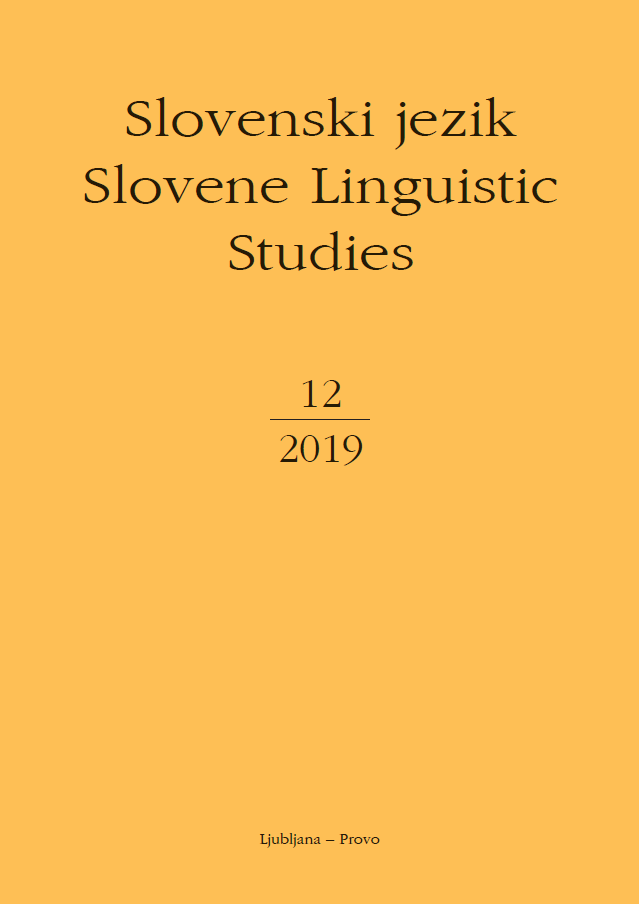Genitive plural endings in the Tersko dialect of Slovene
DOI:
https://doi.org/10.3986/sjsls.12.1.02Abstract
Nouns belonging to the non-mobile root-stressed accentual paradigm of a-declension with roots containing no final consonant clusters or containing consonant clusters of the type ṣ + obstruent usually exhibit the genitive plural ending -Ø, while nouns of the same paradigm with roots containing a final consonant cluster usually exhibit the ending -aj; doublet realizations are also possible. Nouns of the mobile or end-stressed accentual paradigms usually exhibit the genitive plural ending -í ː.
The predominant genitive plural ending of nouns of the masculine o-declension is -e/-ẹ́ ː, the first with nouns belonging to the non-mobile root-stressed accentual paradigm and the second with those belonging to the end-stressed accentual paradigm (rarely also those nouns which historically, i.e. prior to dialectal accentual changes, belonged to the mobile accentual paradigm). The ending -í ː appears in nouns reflecting the Psl. accentual paradigms c and b with a (post-)Psl. long root vowel, and in most nouns synchronically belonging to the end-stressed accentual paradigm.
Due to the decline of this grammatical category, nouns belonging to the neuter o-declension exhibit a mixed state, most evident in nouns with the suffix -iṣc̣e (e.g. gen. pl. koṣìː ṣc̣-Ø : kopìː ṣc̣-e : rabìː ṣc̣-aj). Nouns with roots containing no final consonant clusters or containing a consonant cluster of the type ṣ + obstruent usually exhibit the ending -Ø, however not without exceptions.
Nouns of the i-declension with rare few exceptions exhibit the ending -í ː, also in nouns belonging to the (otherwise) non-mobile root-stressed accentual paradigm. Only in the accentual paradigm exhibiting circumflex root-stress in all forms, comprised of Friulian feminine loan-words with word-final consonants, do we find the unstressed ending -i̥.
The ending -úː, originally the ending of genitive dual, was found in four nouns, denoting paired realia: gen. pl. (fem.) noú ː, rokú ː, (masc.) roú ː, and (neut.) oc̣ú ː, and with the noun (fem.) óː ra (rod. mn. orú ː); the motivation for the generalization of the pluralized (originally dual) form in the latter example is not clear.
The ending -aj appears especially with nouns of the a-declension, and only as a secondary ending with nouns of other declensions; it appears predominantly with roots containing final consonant clusters. The ending was formed by dialectal vocalization of an epenthetic schwa in word-final consonant clusters of the type consonant + j, which arose as a result of the dropping of Psl. weak yers (e. g. gen. pl. Psl. *bűrjь, *grâbĺь > Csln. *bûrəj, *grâbəĺ > Ter. bùːraj, ràːbaj). It then spread to roots of nouns with root-final consonant cluster without a final j and after that onto other types of roots.
Downloads
References
Cronia, Arturo. 1950. Contributi alla dialettologia slovena. Slavistična revija 3/3–4: 321–326.
Ježovnik, Janoš. 2019. Notranja glasovna in naglasna členjenost terskega narečja slovenskega jezika. Disertacija. Ljubljana: Filozofska fakulteta Univerze v Ljubljani.
Kapović, Mate. 2015. Povijest hrvatske akcentuacije. Zagreb: Matica hrvatska.
Karta slovenskih narečij z večjimi naselji, 2016. V: Jožica Škofic et al.: Slovenski lingvistični atlas 2, Kmetija 1: atlas. Ljubljana: Založba ZRC, ZRC SAZU. https://fran.si/204/ sla-slovenski-lingvisticni-atlas/datoteke/SLA_Karta-narecij.pdf, dostop 2. 4. 2019.
Ramovš, Fran. 1952. Morfologija slovenskega jezika. Ljubljana: Državna založba Slovenije.
Rigler, Jakob. 1963. Pregled osnovnih razvojnih etap v slovenskem vokalizmu. Slavistična revija 14: 25–78. Ponatisnjeno v: Jakob Rigler (ur. Vera Smole), Zbrani spisi 1: Jezikovnozgodovinske in dialektološke razprave, 19–57. Ljubljana 20014: Založba ZRC, ZRC SAZU.
Šekli, Matej. 2018: Tipologija lingvogenez slovanskih jezikov. Ljubljana: Založba ZRC, ZRC SAZU.
Downloads
How to Cite
Issue
Section
License
Authors guarantee that the work is their own original creation and does not infringe any statutory or common-law copyright or any proprietary right of any third party. In case of claims by third parties, authors commit their self to defend the interests of the publisher, and shall cover any potential costs.
More in: Submission chapter





